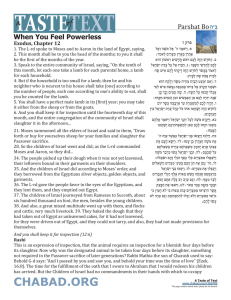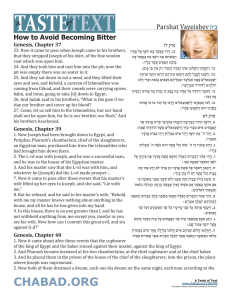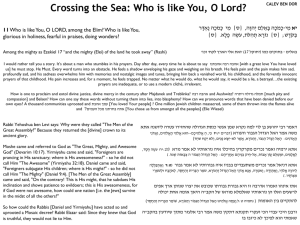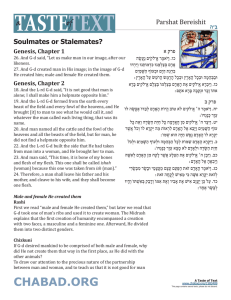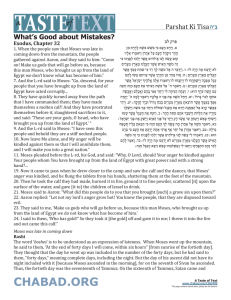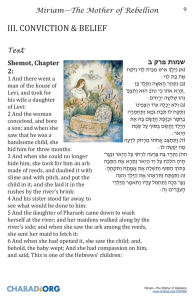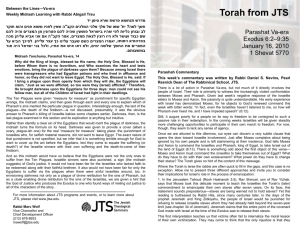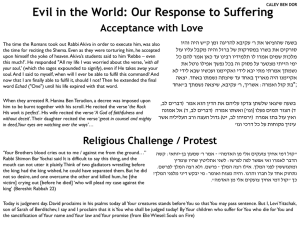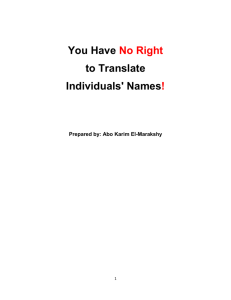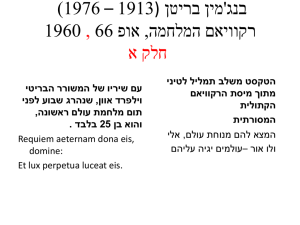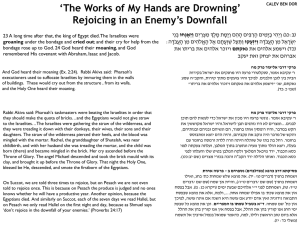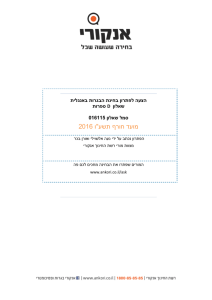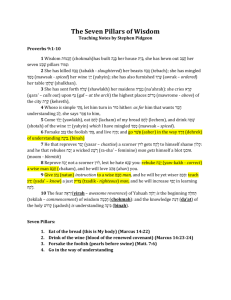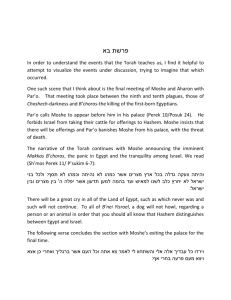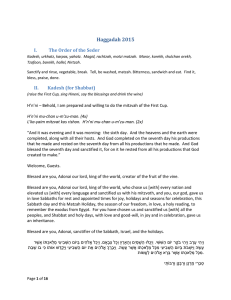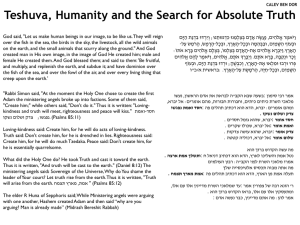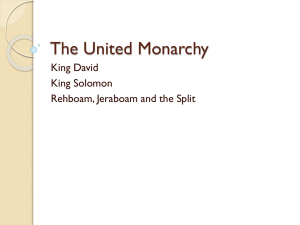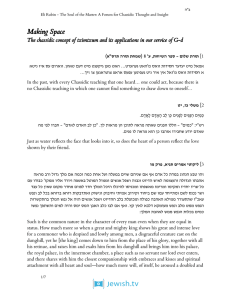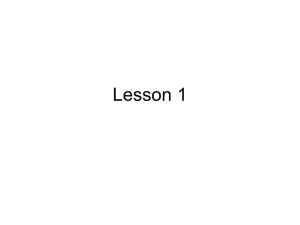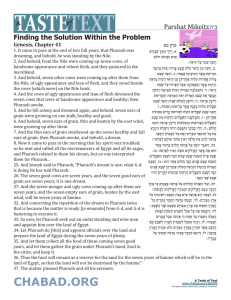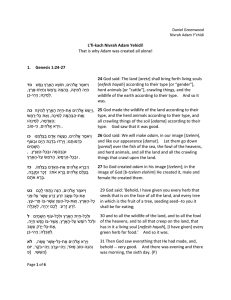בְּכָל דּוֹר וָדוֹר
advertisement
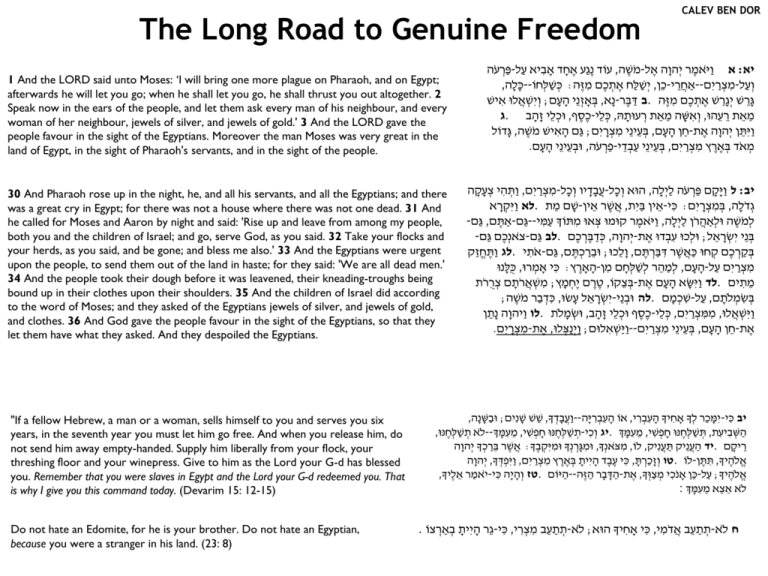
The Long Road to Genuine Freedom CALEV BEN DOR 1 And the LORD said unto Moses: ‘I will bring one more plague on Pharaoh, and on Egypt; afterwards he will let you go; when he shall let you go, he shall thrust you out altogether. 2 Speak now in the ears of the people, and let them ask every man of his neighbour, and every woman of her neighbour, jewels of silver, and jewels of gold.' 3 And the LORD gave the people favour in the sight of the Egyptians. Moreover the man Moses was very great in the land of Egypt, in the sight of Pharaoh's servants, and in the sight of the people. פ ְַרעֹה- עֹוד ֶׁנגַע ֶׁאחָּ ד ָּאבִ יא עַ ל,מֹשֶׁ ה- א וַי ֹאמֶׁ ר יְהוָּה ֶׁאל:יא ,כָּלָּה-- כְ ַשלְחֹו:יְשלַח ֶׁא ְתכֶׁם ִמזֶׁה ַ ,כֵן- ַאחֲ ֵרי-- ִמ ְצ ַריִם-וְ עַ ל בְ ָּאזְ נֵי הָּ עָּ ם; וְ י ְִשאֲ לּו ִאיש,נָּא-ב דַ בֶׁ ר. ג ֵָּרש יְ ג ֵָּרש ֶׁא ְתכֶׁם ִמזֶׁה ג. ּוכְ לֵי זָּהָּ ב,כֶׁסֶׁ ף- כְ לֵי,עּותּה ָּ וְ ִאשָּ ה מֵ ֵאת ְר,מֵ ֵאת ֵרעֵ הּו גָּדֹול, בְ עֵ ינֵי ִמצְ ָּריִ ם; גַם הָּ ִאיש מֹשֶׁ ה,חֵ ן הָּ עָּ ם-וַיִתן יְהוָּה ֶׁאת ֵ . ּובְ עֵ ינֵי הָּ עָּ ם,פַרעֹה ְ - בְ עֵ ינֵי עַ בְ דֵ י,ְמאֹד בְ ֶׁא ֶׁרץ ִמצְ ַריִ ם 30 And Pharaoh rose up in the night, he, and all his servants, and all the Egyptians; and there was a great cry in Egypt; for there was not a house where there was not one dead. 31 And he called for Moses and Aaron by night and said: 'Rise up and leave from among my people, both you and the children of Israel; and go, serve God, as you said. 32 Take your flocks and your herds, as you said, and be gone; and bless me also.' 33 And the Egyptians were urgent upon the people, to send them out of the land in haste; for they said: 'We are all dead men.' 34 And the people took their dough before it was leavened, their kneading-troughs being bound up in their clothes upon their shoulders. 35 And the children of Israel did according to the word of Moses; and they asked of the Egyptians jewels of silver, and jewels of gold, and clothes. 36 And God gave the people favour in the sight of the Egyptians, so that they let them have what they asked. And they despoiled the Egyptians. ו ְַת ִהי צְ עָּ ָּקה, ִמצְ ַריִם-עֲבָּ דָּ יו וְ כָּל- הּוא וְ כָּל,פַרעֹה לַיְלָּה ְ ל וַ י ָָּּקם:יב לא ַוי ְִק ָּרא. שָּ ם מֵ ת- אֲ שֶׁ ר ֵאין, ֵאין בַ יִת- כִ י: בְ ִמצְ ָּריִ ם,גְ דֹלָּה - גַם, ַא ֶׁתם-גַם-- וַי ֹאמֶׁ ר קּומּו צְ אּו ִמתֹוְך עַ ִמי,ּולְאהֲ רֹן לַיְלָּה ַ לְ מֹשֶׁ ה -צ ֹאנְכֶׁם גַם-לב גַם. כְ ַדבֶׁ ְרכֶׁם,יְהוָּה-יִש ָּר ֵאל; ּולְכּו עִ ְבדּו ֶׁאת ְ ְבנֵי לג ו ֶַׁתחֱ זַק. א ִֹתי- גַם, וָּלֵכּו; ּובֵ ַרכְ ֶׁתם,בְ ַק ְרכֶׁ ם ְקחּו כַאֲ שֶׁ ר ִדבַ ְר ֶׁתם ֻּכלָּנּו, כִ י ָּא ְמרּו:הָּ ָּא ֶׁרץ- לְמַ הֵ ר לְ שַ לְחָּ ם ִמן,הָּ עָּ ם-ִמצְ ַריִם עַ ל טֶׁ ֶׁרם י ְֶׁחמָּ ץ; ִמ ְשאֲ ר ָֹּתם צְ רֻּ רֹת,בְ צֵ קֹו-לד וַיִ שָּ א הָּ עָּ ם ֶׁאת. מֵ ִתים ; כִ ְדבַ ר מֹשֶׁ ה,יִ ְש ָּר ֵאל עָּ שּו-לה ּובְ נֵי. ִשכְ מָּ ם- עַ ל,ֹלתם ָּ בְ ִש ְמ לו וַיהוָּה נ ַָּתן. ּושמָּ ֹלת ְ ,כֶׁסֶׁ ף ּוכְ לֵי זָּהָּ ב- כְ לֵי, ִמ ִמצְ ַריִ ם,וַיִ ְשאֲ לּו . ִמצְ ָּריִם- ֶׁאת,וַ י ְַש ִאלּום; וַיְ נַצְ לּו-- בְ עֵ ינֵי ִמצְ ַריִ ם,חֵ ן הָּ עָּ ם-ֶׁאת "If a fellow Hebrew, a man or a woman, sells himself to you and serves you six years, in the seventh year you must let him go free. And when you release him, do not send him away empty-handed. Supply him liberally from your flock, your threshing floor and your winepress. Give to him as the Lord your G-d has blessed you. Remember that you were slaves in Egypt and the Lord your G-d redeemed you. That is why I give you this command today. (Devarim 15: 12-15) Do not hate an Edomite, for he is your brother. Do not hate an Egyptian, because you were a stranger in his land. (23: 8) , שֵ ש שָּ נִים; ּובַ שָּ נָּה, ַועֲבָּ ְדָך-- אֹו הָּ עִ בְ ִריָּה,יִמָּ כֵר לְָך ָּא ִחיָך הָּ עִ בְ ִרי-יב כִ י ,ל ֹא ְתשַ לְחֶׁ ּנּו-- מֵ עִ מָּ ְך, ְתשַ לְחֶׁ ּנּו חָּ פְ ִשי-יג וְ כִ י. מֵ עִ מָּ ְך, ְתשַ לְחֶׁ ּנּו חָּ פְ ִשי,הַ ְשבִ יעִ ת אֲ שֶׁ ר בֵ ַרכְ ָך יְהוָּה:ּומי ְִקבֶׁ ָך ִ ּומג ְָּרנְָך ִ , ִמצ ֹאנְָך, לֹו,יד הַ ֲענֵיק ַת ֲענִיק. יקם ָּ ֵר יְהוָּה, ַו ִיפְ ְדָך,ִית בְ ֶׁא ֶׁרץ ִמצְ ַריִם ָּ כִ י עֶׁ בֶׁ ד הָּ י,טו וְ ָּזכ ְַר ָּת. לֹו- ִת ֶׁתן,אֱ ֹלהֶׁ יָך ,י ֹאמַ ר ֵאלֶׁיָך-טז וְ הָּ יָּה כִ י. הַ יֹום--הַ דָּ בָּ ר הַ זֶׁה- ֶׁאת,כֵן ָּאנֹכִ י ְמצַ ּוְ ָך-אֱ ֹלהֶׁ יָך; עַ ל : ל ֹא ֵאצֵ א מֵ עִ מָּ ְך . ִית בְ ַא ְרצֹו ָּ גֵר הָּ י- כִ י, ְת ַתעֵ ב ִמצְ ִרי- כִ י ָּא ִחיָך הּוא; ל ֹא, ְת ַתעֵ ב אֲ ד ִֹמי-ח ל ֹא Freedom through Emotional Closure A people driven by hate are not – cannot be – free. Had the people carried with them a burden of hatred and a desire for revenge, Moses would have taken the Israelites out of Egypt, but he would not taken Egypt out of the Israelites. They would still be there, bound by chains of anger as restricting as any metal. To be free you have to let go of hate. That means drawing a line over the resentments of the past. That is why, when a slave went free, his master had to give him gifts. This was not to compensate for the fact of slavery. There is no way of giving back the years spent in servitude. But there is a way of ensuring that the parting is done with goodwill, with some symbolic compensation. The gifts allow the former slave to reach emotional closure; to feel that a new chapter is beginning; to leave without anger and a sense of humiliation. One who has received gifts finds it hard to hate. That is the significance of the silver and gold taken from the Egyptians by the Israelites at the express command of G-d. The early twentieth century commentator Benno Jacob translated the word venitzaltem in Shemot 3: 22 as ‘You shall save,’ not ‘You shall plunder’ the Egyptians. The gifts they took from their neighbours were intended, Jacob argues, to persuade the Israelites that it was not the Egyptians as a whole, only Pharaoh and the leadership, who were responsible for their enslavement. They were meant to save the Egyptians from any possible future revenge by Israel. (Jonathan Sacks) In every generation a person is obligated to see himself as though he actually left Egypt In every generation they arise to destroy us… בְּ כָ ל ּדֹור וָ דֹור חַ יָּב ָּאדָּ ם לִ ְראֹות ֶׁאת עַ צְ מֹו כְ ִאלּו הּוא יָּצָּ א ִמ ִמצְ ַריִ ם בְּ כָ ל ּדֹור וָ דֹור עומדים עלינו לכלותינו Israel is a frightened society. To look for the source of the obsession with force and to uproot it, you have to deal with the fears. And the meta-fear, the primal fear is the six million Jews who perished in the Holocaust…The true Israeli rift today is between those who believe and those who are afraid. The great victory of the Israeli right in the struggle for the Israeli political soul lies in the way it has imbued it almost totally with absolute paranoia. I accept that there are difficulties. But are they absolute? Is every enemy Auschwitz? As of this moment, Israel is a state of trauma in nearly every one of its dimensions…we say we do not trust the world, they will abandon us, and here's Chamberlain returning from Munich with the black umbrella and we will bomb them [Iran] alone…The goy there (in the US) is not hostile but embracing. And as a result, what emerges is a Jewish experience of integration, not separation. Not segregation. I find those things lacking here. Here the goy is what he was in the ghetto: confrontational and hostile" (Avram Burg) She’s feeling bad, Avram senses, and she’s taking it out on them. He looks at her and sees her face turn ugly. “Aren’t you angry at them? Don’t you have any anger or hatred about what they did to you there?” Avram thinks. The old man from the meat locker comes to his mind, lying naked on the sidewalk, banging his head against it, twitching in front of the soldiers. “What do you have to think about for so long? Me, if someone did to me a quarter of what they did to you, I’d run them down to the corners of the earth. I’d hire mercenaries to take revenge even now” “No” he says, and runs a vision of his tormentors in front of his eyes: the chief interrogator, Lieutenant Colonel Doctor Ashraf, with his sly little eyes and his sickeningly flowery Hebrew, and the hands that tore Avram to shreds. And the jailors in Abbasiya, who beat him whenever they could, who were drawn to torture him more than the others, as though something about him drove them crazy. And the two who buried him alive, and the guy who stood on the side and took photographs, and the two men who brought him in from outside - Ashraf told him they were trucked in especially for him, two guys from death row, rapists from a civilian prison in Alexandria - even them he doesn’t hate anymore. All he feels when he thinks of them is insipid despair, and sometimes simple, raw sadness at having had the misfortune to end up there and see the things he saw. (To the End of the Land, David Grossman)
